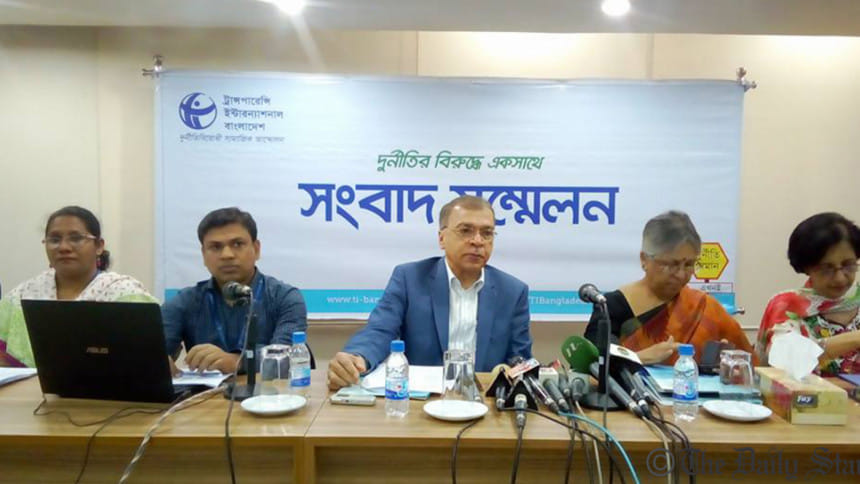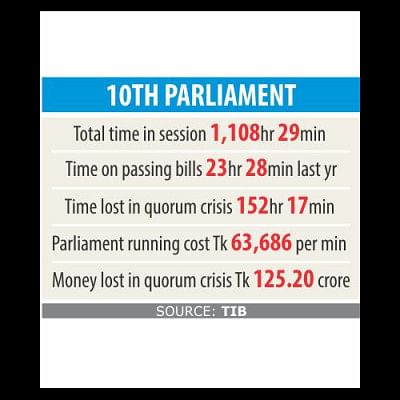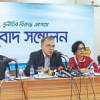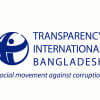TIB Study on 10th JS: Only 24 hrs spent on lawmaking in 2017

Lawmakers of the 10th parliament, until December last, spent just nine percent of their time in parliament to pass laws, according to a TIB study.
The study said in the 18 sessions of this parliament, about 30 minutes on average was lost in every sitting due to quorum crises over the four years.
The average quorum crisis in every sitting was 25 minutes in eighth parliament and 32 minutes in ninth parliament, said the TIB study.
At least 60 MPs are required to be present in the parliament for proceedings to continue and the ruling Awami League alone has 274 MPs in this parliament.
The study, titled "Parliament Watch: 10th Jatiya Sangsad [14th to 18th session] 2017”, was released at a press conference at the TIB office in the capital yesterday.

It claimed that an estimated Tk 63,686 per minute is spent during sessions.
It said Tk 5 lakh was being spent every month on Jatiya Party chief and Prime Minister's Special Envoy HM Ershad even though he had not discharged his duty as the special envoy.
The study said Ershad attended only 79 out of the 327 days the parliament was in session.
Only 26 MPs participated in the passage of 24 bills between 14th and 18th sessions held last year, the TIB said.
The 10th parliament spent an average 35 minutes on passing a bill, the TIB said, adding that the Indian parliament spent 2 hour and 23 minutes on average to do the same.
In eighth and ninth parliament, the average time for passage of a bill was 34 minutes and 28 minutes respectively.
The eighth and ninth parliament spent 10 percent and 9.5 percent of their time on law making, the TIB added.
“Spending less time in passing a bill shows MPs are not interested in playing their due role. MPs lack interest in the law-making process,” said TIB Executive Director Iftekharuzzaman.
The TIB said opportunities for people's participation in law making was still limited due to rejections of proposals for seeking public opinion.
The anti-graft watchdog said discussions on bills were limited to only specific treasury and opposition bench MPs as only seven percent of the MPs took part in the law-making process.
Last year, 25.6 percent time of parliament was spent on budget discussions while 24.7 percent was spent on discussions on the thanksgiving motion on the president's speech.
The study said discussions, on budget and on thanksgiving motion, were marred by vulgar and provocative words used against political parties not represented in this parliament.
Use of unparliamentary language in parliament against the civil society and international organisations were also notable, it said.
The study said Speaker Shirin Sharmin Chaudhury could not take effective measures to prevent MPs from using abusive words.
On the parliamentary standing committees, the TIB said 46 parliamentary watchdogs held around 900 meetings in the five sessions last year while 42 committees held one meeting every month following the rules of the parliament.
Four standing committees did not hold any meeting last year.
About the positive sides of the present parliament, the study said average presence of MPs at every sitting has increased (88 percent) while participation of opposition MPs in the law-making process also increased.
Although presence of female MPs increased compared to their male colleagues, their participation in parliament's business was less.
The TIB study said the presence of ministers in parliament decreased.
The study said from the very beginning, the main opposition in parliament had been suffering from an identity crisis due to their double role in treasury and opposition benches.
It said it was also notable that the opposition, echoing the same voice of the ruling party, was criticising the political alliance that remains outside the parliament.
In reply to a question, Iftekharuzzaman said he still thinks the present parliament is like a puppet show stage. The opposition party does not know their actual role in parliament and why they are in the House.
Responding to another question, Iftekharuzzaman said the government and the opposition were responsible for the present parliament being unable to properly ensure good governance, accountability, and combat graft.
The TIB recommended the House passes a bill on the code of conduct for MPs to make the parliament effective and amends article 70 of the constitution. It also urged the Speaker to be firm in stopping the use of abusive words in parliament.
The Speaker refused to comment on the TIB observations and HM Ershad could not be reached over the phone.

 For all latest news, follow The Daily Star's Google News channel.
For all latest news, follow The Daily Star's Google News channel. 








Comments